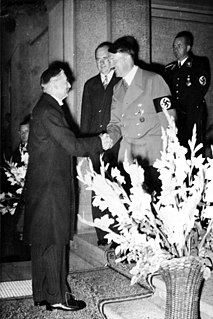Related Research Articles

Arthur Neville Chamberlain was a British politician of the Conservative Party who served as Prime Minister of the United Kingdom from May 1937 to May 1940. He is best known for his foreign policy of appeasement, and in particular for his signing of the Munich Agreement on 30 September 1938, ceding the German-speaking Sudetenland region of Czechoslovakia to Nazi Germany led by Adolf Hitler. Following the German invasion of Poland on 1 September 1939, which marked the beginning of the Second World War, Chamberlain announced the declaration of war on Germany two days later and led the United Kingdom through the first eight months of the war until his resignation as prime minister on 10 May 1940.

The Sudetenland is the historical German name for the northern, southern, and western areas of former Czechoslovakia which were inhabited primarily by Sudeten Germans. These German speakers had predominated in the border districts of Bohemia, Moravia, and Czech Silesia since the Middle Ages. Sudetenland had been since the 9th century an integral part of the Czech state both geographically and politically.

The Munich Agreement was an agreement concluded at Munich on 30 September 1938, by Germany, the United Kingdom, France, and Italy. It provided "cession to Germany of the Sudeten German territory" of Czechoslovakia, despite the existence of a 1924 alliance agreement and 1925 military pact between France and the Czechoslovak Republic, for which it is also known as the Munich Betrayal. Most of Europe celebrated the Munich agreement, which was presented as a way to prevent a major war on the continent. The four powers agreed to the German annexation of the Czechoslovak borderland areas named the Sudetenland, where more than three million people, mainly ethnic Germans, lived. Adolf Hitler announced that it was his last territorial claim in Northern Europe.

Appeasement in an international context is a diplomatic policy of making political, material, or territorial concessions to an aggressive power in order to avoid conflict. The term is most often applied to the foreign policy of the UK governments of Prime Ministers Ramsay MacDonald, Stanley Baldwin and Neville Chamberlain towards Nazi Germany and Fascist Italy between 1935 and 1939. Under British pressure, appeasement of Nazism and Fascism also played a role in French foreign policy of the period, but was always much less popular than in the United Kingdom.
The events preceding World War II in Europe are closely tied to the bellicosity of Fascist Italy, Nazi Germany, and Imperial Japan, as well as the Great Depression. The peace movement led to appeasement and disarmament.

Édouard Daladier was a French Radical-Socialist (centre-left) politician, and the Prime Minister of France who signed the Munich Agreement before the outbreak of World War II.

The military occupation of Czechoslovakia by Nazi Germany began with the German annexation of the Sudetenland in 1938, continued with the creation of the Protectorate of Bohemia and Moravia, and by the end of 1944 extended to all parts of Czechoslovakia.

Georges-Étienne Bonnet was a French politician who served as foreign minister in 1938 and 1939 and was a leading figure in the Radical Party.

The causes of World War II, a global war from 1939 to 1945 that was the deadliest conflict in human history, have been given considerable attention by historians from many countries who studied and understood them. The immediate precipitating event was the invasion of Poland by Nazi Germany on September 1, 1939, and the subsequent declarations of war on Germany made by Britain and France, but many other prior events have been suggested as ultimate causes. Primary themes in historical analysis of the war's origins include the political takeover of Germany in 1933 by Adolf Hitler and the Nazi Party; Japanese militarism against China, which led to the Second Sino-Japanese War; Italian aggression against Ethiopia, which led to the Second Italo-Ethiopian War and Germany's initial success in negotiating the Molotov–Ribbentrop Pact with the Soviet Union to divide the territorial control of Eastern Europe between them.
Charles Corbin (1881–1970) was a French diplomat who served as ambassador to Britain before and during the early part of the Second World War, from 1933 to 27 June 1940.

The European foreign policy of the Chamberlain ministry from 1937 to 1940 was based on British Prime Minister Neville Chamberlain's commitment to "peace for our time" by pursuing a policy of appeasement and containment towards Nazi Germany and by increasing the strength of Britain's armed forces until, in September 1939, he delivered an ultimatum over the invasion of Poland, which was followed by a declaration of war against Germany.
Events in the year 1938 in Germany.

The Godesberg Memorandum is a document issued by Adolf Hitler in the early hours of 24 September 1938 concerning the Sudetenland and amounting to an ultimatum addressed to the government of Czechoslovakia.
The United Kingdom declared war on Germany on 3 September 1939, two days after Germany invaded Poland. France also declared war on Germany later the same day.
A Total and Unmitigated Defeat was a speech by Winston Churchill in the House of Commons at Westminster on Wednesday, 5 October 1938, the third day of the Munich Agreement debate. Signed five days earlier by Prime Minister Neville Chamberlain, the agreement met the demands of Nazi Germany in respect of the Czechoslovak region of Sudetenland.
The following events occurred in September 1939:
The following events occurred in October 1939:
The following events occurred in September 1938:
Robert Coulondre was a French diplomat who served as the last French ambassador to Germany before World War II.

Hitler's 1 September 1939 Reichstag speech is a speech made by Adolf Hitler at an Extraordinary Session of the German Reichstag on 1 September 1939, the day of the German invasion of Poland. The speech served as public declaration of war against Poland and thus of the commencement of World War II.
References
- ↑ "75 Years Ago: Hitler's Phony Plea for Peace". Time. 16 October 1939. Retrieved October 29, 2021.
- 1 2 3 4 5 "INTERNATIONAL: Last Statement", Time, 16 October 1939, retrieved October 29, 2021
- ↑ Gordon Skene (6 October 2014). "Adolf Hitler Addresses The Reichstag – October 6, 1939 – Past Daily Reference Room". Past Daily. Retrieved October 30, 2021.
- ↑ Adolf Hitler (6 October 2014). "I Am Ready for Peace or War – Destiny Will Decide who is Right". Ibiblio. School of Information and Library Science, and Information Technology Services, University of North Carolina at Chapel Hill. Retrieved October 30, 2021.
- 1 2 3 Shirer, William (1960). The Rise and Fall of the Third Reich. Simon and Schuster. pp. 641–642. ISBN 9780831774042. LCCN 60-6729.
- ↑ Edouard Daladier (6 October 2014). "France Must Fight: Our Troops are in Enemy Territory". Ibiblio. School of Information and Library Science, and Information Technology Services, University of North Carolina at Chapel Hill. Retrieved October 30, 2021.